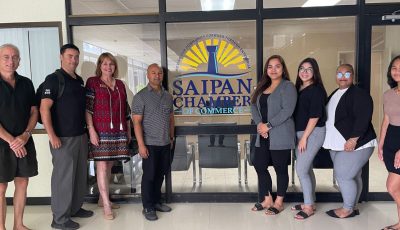Number of fall applicants for NMI scholarship awards drop
The number of new scholarship applicants who will go to the Northern Marianas College and those who will study overseas also showed a decline, based on agency records.
The scholarship office received only 948 applications for the fall 2012 semester, a decline when compared to the 1,055 applications submitted for the fall 2011 semester.
In the same period last year, NMC’s new applicants totaled 291, of which 347 were ongoing and 31 were returning students. This fall 2012, new applicants who go to NMC totaled just 225, composed of 282 ongoing students and 77 returning students.
For off-island applications last year, Che said that there were a total of 122 new students; 241 ongoing and 23 returning students. This fall 2012, off-island new students totaled 86; ongoing 221; and returning students, 53.
Che said the number of new applicants to NMC dropped by 12.8 percent while those applying overseas decreased by 17.3 percent-from 122 in fall 2011 to 86 in fall 2012.
“Fluctuations from year to year are unknowable, and there are many possible causes. We have seen a phenomenal growth in applications over the past decade but it is not surprising that the number of applications is lower than last year,” Che told Saipan Tribune.
One reason, she said, is the recent changes to the regulations governing the Educational Assistance Program, which means that application patterns this year may be different from previous years.
Beginning this school year 2013, a new applicant can only be eligible for financial assistance if he or she adheres to certain regulations.
Based on Section V of the new regulation, all new applicants beginning fall 2012 will only receive financial assistance if they are either enrolled at NMC or if they are enrolled at another accredited institution and have already obtained an associate degree. However, this requirement will be waived if the applicant resides in the CNMI at the time of application; if the applicant’s qualification for the residency requirement is based on residence on an island other than Saipan; and if the island on which the applicant resides does not have an NMC satellite campus that offers associate degree programs, either in person or online.
“The drop in new applications for off-island studies is due to the serious effort put in by the Scholarship Advisory Board, NMC outreach efforts, and many others in making sure that each student and their parents know the benefits of attending the local college first before transferring to a four-year program,” explained Che, adding that close to 20 percent of this year’s ongoing and returning overseas EAP applicants are enrolled in community colleges in Guam and across the nation, taking up courses that are already offered at NMC.
Although the reasons she cited may not be the best indicator for the drop in applications this year, Che said “it is clearly a positive indicator for students transitioning to a more direct, affordable, and practical route.”
She said the lower number of applications does not necessarily mean a drop in the number of students pursuing higher education. She believes that another important factor is the perception of being denied a scholarship due to grades and the uncertainty of funding levels.
“Most of us assume that when there is an economic downturn, the numbers will go up and we saw that in fiscal years 2009, 2010, and 2011. But as our applicants learned about the financial realities of college debt, the required service obligation, and scholarship disbursement delays, our numbers have gone back down,” added Che.



























